It is now three months since some of the members of the punk rock band Pussy Riot were detained in a remand prison, awaiting their trial for their punk-prayer ‘Holy Virgin, get rid of Putin!’ in the main Russian cathedral, Moscow’s Christ the Saviour.
Prisoners of conscience or hooligans?
The Pussy Riot story has long since become more than just an art event; it has acquired political overtones and even Amnesty International has recognised the girls as prisoners of conscience. Some days ago one of the Pussy Riot girls went on hunger strike in support of her demand to be moved to solitary detention because relations with her cellmates were so bad. Her demands were only met on 21 May, some five days later, when the media had picked up information about her hunger strike.
Why is it that girls from a punk rock band are being held on remand and accused under the ‘hooliganism’ article of the Criminal Code, with a possible maximum sentence of 7 years, when all they did was to execute a few steps in the pulpit of the Cathedral?
‘The Pussy Riot story has long since become more than just an art event; it has acquired political overtones and even Amnesty International has recognised the girls as prisoners of conscience.’
There is no rational answer to this question. Any administrative penalty, such as a fine, would have given rise to many fewer repercussions than criminal proceedings. Their performance wasn’t even a punk concert, as it might appear from the video clip, which has had more than a million viewings on You Tube http://www.youtube.com/watch?y=GCasuaAczKY. Careful examination reveals that the video is a cut and paste job: the scenes where the girls play the guitar were obviously not filmed in the Cathedral. There they only managed to get up into the pulpit, take a few steps and, falling on their knees, to make the sign of the cross before they were dragged away by security guards. The scenes with the guitars were filmed in another cathedral, so the three girls are being held because of a fake video clip.
Church vs art
The story of the relationship between the Russian Orthodox Church (ROC) and modern art is a long one. The most striking episode was Avdei Ter-Oganyan’s protest: during his performance ‘The Young Atheist’ he hacked copies of icons to pieces. This was his radical way of putting up a fight for the ‘aura’ (Walter Benjamin) of the original in the age of mechanical reproduction. Ter-Oganyan has now been living in emigration for more than ten years: he left Russia when criminal proceedings were instituted against him.
The Pussy Riot girls belong to quite another generation. They didn’t live in the Soviet Union, when one really could lose one’s liberty for some ideological misdemeanour. They remained in Russia, probably unable to believe in the unprecedented cruelty of the state, and have been punished for it.
The words of the song they sang in the Cathedral might well not have been to the liking of Russia’s highest-ranking personages, especially just before the presidential election, but should the girls really have been put in prison for an offence of this kind? Pussy Riot obviously trod on a very painful corn of Russian leaders, clerical or secular.
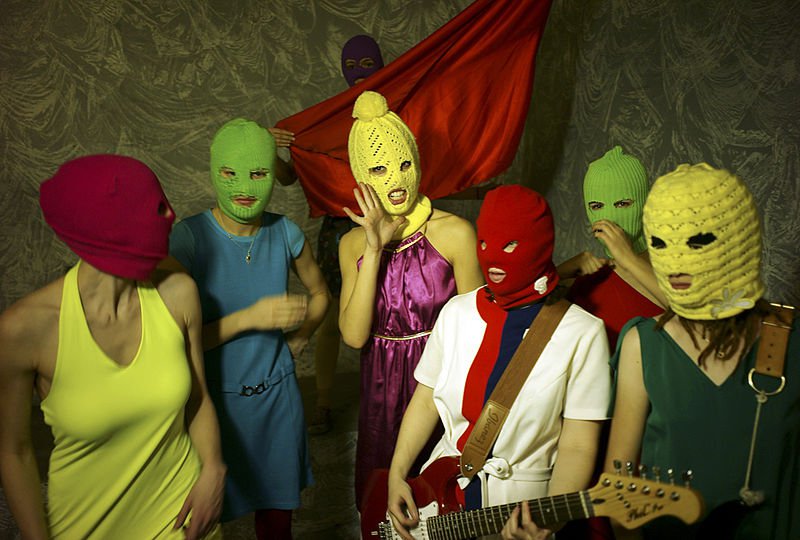
The story of the Pussy Riot feminist punk group, who performed a punk-prayer in Moscow's Cathedral of Christ the Saviour has shown up the divisions in Russian society. For state and church leaders the group’s performance was blasphemy, for the democratic opposition a legitimate act of protest.
The song hinted at the overly close friendship between Church and State: they sang that Patriarch ‘Kirill believes in Putin, when he’d do better to believe in God.’ There was also a hint of the Patriarch’s links with the FSB. Public opinion was outraged by the phrase ‘Holy shit!’ which was part of the refrain. This is not blasphemy; it simply means that the situation being described is shameful before God. The phrase itself is current youth slang. The song also contained a plea to the Holy Virgin to become a feminist. All in all, the words of the song and the whole performance would have been worthy of at most an administrative fine, or community service for disturbance of the peace. But matters took quite another turn.
Two of the Pussy Riot girls, Nadezhda Tolokonnikova and Mariya Alyokhina, were arrested a few days after the ‘punk-prayer’ and a third, Yekaterina Samutsevich, was picked up soon after. The girls are not just punk-rockers, but educated as well. Tolokonnikova is studying philosophy at Moscow State University, Alyokhina is studying at the Institute of Journalism and works as a volunteer in the Children’s Psychiatric Hospital. Samutsevich is a student at the progressive Rodchenko School of Multimedia Studies.
Inheriting the Voina mantle
Pussy Riot has obviously taken a leaf out of the Voina [street art group, Rn word for war] book. Their 2010 project ‘Dick captured by the FSB’ involved painting a huge phallus on Petersburg’s Liteiny Bridge, right opposite the FSB building. The phallus rose in a most impressive way every time the bridge was opened to let ships through. Two of the Pussy Riot girls had connections with Voina: Tolokonnikova was one the group’s founders and Samutsevich was part of the team that developed and installed their various projects, though she hadn’t featured in the media before that. When Voina disbanded, some of its members (Oleg Vorotnikov, Natalya Sokol and Leonid Nikolayev) moved to Petersburg: they are now co-curating the Berlin Biennale with Artur Zmiyevsky. Tolokonnikova and her husband Pyotr Verzilov remained in Moscow.
‘The Pussy Riot group appeared in the autumn of 2011: its members devised their own particular image, consisting of brightly-coloured balaclavas and dresses. Like the Guerrilla Girls, they hid behind masks and preserved their anonymity, but their target was not feminism – although they definitely consider themselves feminists – so much as the political situation in Russia.’
Initially the Voina events didn’t make many waves. One of them, ‘Hug a Fuzz Lady’, involved girls spending a whole day in the street and the metro kissing women police officers to ‘emancipate them’ http://www.youtube.com/watch?v=l0A8Qf893cs.
The Pussy Riot group appeared in the autumn of 2011: its members devised their own particular image, consisting of brightly-coloured balaclavas and dresses. Like the Guerrilla Girls, they hid behind masks and preserved their anonymity, but their target was not feminism – although they definitely consider themselves feminists – so much as the political situation in Russia. Pussy Riot would appear in public places, the roofs of trolleybuses, for instance, and metro stations, twanging their guitars and singing their songs. The girls immediately attracted the attention of Centre E [the Russian Interior Ministry’s Centre for the Prevention of Extremism].
Pussy Riot’s boldest project was their performance in Red Square of the song ‘Putin pissed himself!' But even this event at the Place of Execution, no less, in the middle of a snowy Red Square didn't particularly anger the authorities. It was only after their punk prayer in the Cathedral of Christ the Saviour that Vladimir Putin himself appeared on central television to apologise to believers, thus covertly signifying that the affair was being dealt with at top level.
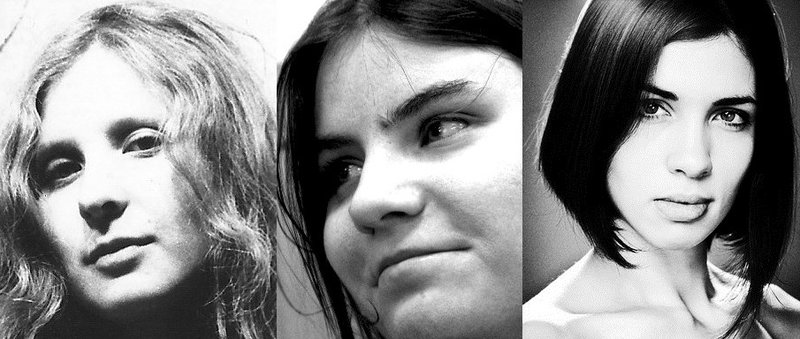
The Pussy Riot girls: (from the left) Nadezhda Tolokonnikova, Mariya Alyokhina, Yekaterina Samutsevich. Amnesty International has recognised them as prisoners of conscience and demanded their immediate release (photo: http://pussy-riot.livejournal.com)
The story's repercussions were unprecedented: Pussy Riot was criticised throughout the media and public opinion was polarised. The Church, too, was split. Patriarch Kirill has a reputation for being a strong conservative: he described the performance as a 'mockery of all that is sacred' and expressed his regret that some believers felt moved to try and find a justification for the girls' behaviour. Another churchman, somewhat less exalted but no less a personality, Deacon Andrey Kurayev, spoke out in defence of the girls, saying they should be admonished, but then released. The performance took place during Mardi Gras, when the Church turns a blind eye to all sorts of funny jokes. The last day of Mardi Gras falls on Shrove Sunday, a holy day when believers forgive each other for any offence caused.
The Church and the Cathedral
Most importantly, the affair has revealed the sickly state of the ROC, which is increasingly becoming involved in matters unrelated to religion, by no means as ascetic as laid down in the Bible, and not averse to money-making. The Church makes constant and regular attempts to get scripture lessons included in the school curriculum, for instance. The authorities regard these attempts with obvious approval and clerical attitudes are becoming more pronounced. But the Pussy Riot event attracted public attention to the Cathedral itself and it has become clear that the services on offer there are commercial, as well as religious.
Journalists from the newspaper Moscow News investigated: they found that the Cathedral and the land it stands on belong to the city of Moscow, not the ROC.
‘Most importantly, the affair has revealed the sickly state of the ROC, which is increasingly becoming involved in matters unrelated to religion, by no means as ascetic as laid down in the Bible, and not averse to money-making.’
The Cathedral is managed by the Christ the Saviour Cathedral Trust, which official rents out facilities in the building. According to Moscow News, the Council Hall with its VIP dressing rooms can be rented for 450,000 roubles per day ($13,830); the Conference Hall for 100,000 roubles ($3,072). The Trust also lets out several small offices on a long-term basis. The newspaper established that in effect many of the companies working in the Cathedral precinct – including a car-wash and underground parking facilities – are managed by the members of one family. The director of the Trust's family. This information makes the Cathedral seem more like a business centre than a house of prayer. That Pussy Riot elected to perform in the Cathedral is evidence they wanted to draw attention to the current state of the ROC. The Moscow News articles produced no reaction whatever. http://www.fxxc.ru/other/
Wider ripples
Pussy Riot in prison has become a symbol of resistance in Russia. The art world is agog. Not everyone views the performance positively, but artists, critics and gallery owners have closed ranks at the injustice of the punishment. Pickets have been set up in defence of the girls and a one-day exhibition in support of Pussy Riot was organised by the curator Tatyana Volkova in a bus which travelled round the Garden Ring, tailed by 8 police cars.
At the last demonstration against the rigged elections on 6 May there was even a whole column of demonstrators in coloured balaclavas to show their solidarity with Pussy Riot. Some sceptics naturally consider that the Pussy Riot girls were competing with the lads from Voina to see who could produce the greater effect, and didn't expect the authorities to come down so hard on them, but that doesn't really matter any more. http://www.facebook.com/photo.php?fbid=451427544870693&set=t.586870807&type=3&theater (photo: Vlad Chizenkov).
The severity and inappropriateness of the reaction to this reasonably innocent, if cheeky, event has turned it into an act of civic resistance, a real political gesture. The authorities themselves politicised it and the government has made Pussy Riot into martyrs of the regime. Until fairly recently it was a fair assumption that Russian society was mired in stagnation, which was forecast to last for another 12 years. Now the protest movement has developed so fast and the three fearless young women have had a hand in it. It's not what they did, but that they overcame their fear. Over the last two weeks a significant section of politically active youth has ended up in police stations, accused of taking part in unsanctioned meetings, and many of them too have overcome their fear of the possible consequences.
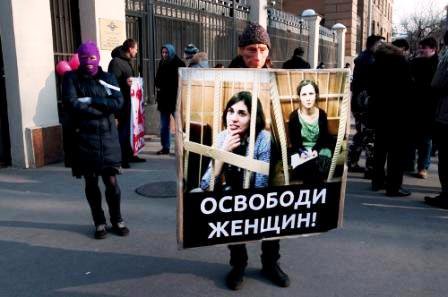
The Russian democratic community was unanimous in its support for Pussy Riot. Numerous protest actions against their arrest have continued until now in Russia and all over the world (photo: http://pussy-riot.livejournal.com)
After the 6 May demonstration, which was broken up particularly violently by OMON [Special Purpose Mobile Police Unit], people stayed in the streets and politically active artists assisted at the birth of the the protest movement Occupy! on the boulevards of Moscow. Energetic protest gradually turned into intelligent protest: activists started working on the political demands they wished to put forward and these were discussed at a daily Assembly. The camp may have been broken up after several days of moving from one place to another, but the new experience of street fighting gained has been indispensable. It's probably too early to start comparing the May 2012 events with Paris in May 1968, but the clock can't be turned back now and society will be unlikely to go back to its previous state of hopeless submission.
The song
Meanwhile..Pussy Riot is still in prison: the hearts of the judges were not even melted by the fact that two of the accused have small children. The investigation has cynically asked for Pussy Riot to be left in prison 'for their own good', so that fervent defenders of the faith don't avail themselves of the opportunity to get even with them. Back in April the criminal investigation team had produced an expert report which was unable to find any motives of hatred or enmity in the actions of Pussy Riot. Psychological and linguistic analysis showed that the song the girls sang in the Cathedral was 'not an incitement to any unlawful actions, nor was it dictated by hatred or enmity towards any social groups.' The experts did conclude that the feelings of some religious people might have been offended, but this is not a crime. The barrister Violetta Volkova maintains, however, that the results of the expert report were given to the investigating officers on 2 April, but the relevant papers were not put with the files when the case for extending the detention of the girls came up in court.
‘Pussy Riot in prison has become a symbol of resistance in Russia. The art world is agog. Not everyone views the performance positively, but artists, critics and gallery owners have closed ranks at the injustice of the punishment.’
While the court was in session, representatives of the artistic world came to the Taganka courthouse, where the case was being heard, to show their support for the girls. There were some arrests outside the courthouse for attempts to sing their song, for trying to put a coloured cap on and for trying to write words of support on the pavement with chalk. Those detained were relased the same day, but the futility of the arrests is baffling and leads to a suspicion that the police are not completely in control of what they do.
And now…?
If there had been any hopes that the new Minister of Culture would be a democratically-minded official who would help to get the girls released, then the appointment of Vladimir Medinsky will have dashed them. When he appeared on a TV talk show, he described the girls as 'immoral women' and compared their trial with the trial of the revolutionary and terrorist, Vera Zasulich. Medinsky didn't insist that Pussy Riot should stay in prison, but suggested that as a punishment they should work as cleaners in a maternity hospital, or sing in a mosque. One thing is quite clear – the new Minister of Culture has a vivid imagination. But one still hopes that Pussy Riot will triumph in the end.
Read more
Get our weekly email
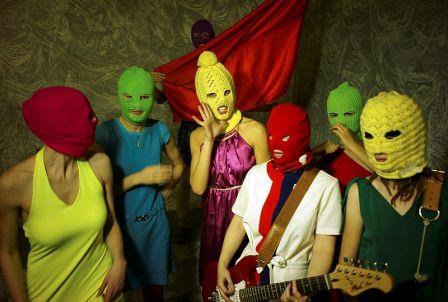







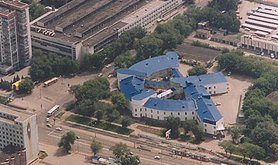



Comments
We encourage anyone to comment, please consult the oD commenting guidelines if you have any questions.